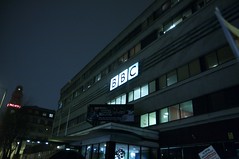This month’s social media cafe was another triumph for the community and came with the extra special glow of being held at the BBC in Manchester, complete with Tardis in the foyer. Thanks Ian!
I’ll refer you to Tim’s roundup of the sessions at the cafe (they were good) as he had the opportunity to flit around. I settled in to watch the chaps from Cahoona and events management agency Ear to the Ground discuss the Cutting Room Experiment, a project described in classic hyperbole as the ‘biggest user generated event in the world’.
My thoughts on the Cutting Room Experiment
I have to admit, when I first saw the press release from Manchester City Council, my heart sank. The press release, regrettably, reads a bit like the classic ‘public sector tries to do social media, misses the point’ with a smattering of buzz words: ‘flash mobs’; ‘user generated’; ‘unique event’, complete with manufactured quote from a director. It’s unfortunate that this was the first piece of publicity I saw.
What I saw next, thankfully, was a pretty darn nice website, complete with integrated social media PR campaign that picked up some great coverage online. This was followed up by a ‘blog launch‘ at the Bay Horse, suitably bribing people with the offer of a free pint in exchange for a short (and painless) presentation from the team.
I think this quickly shattered my misconceptions. Though not my misgivings.
In the end, Cutting Room Experiment turned out to be just that, a bold experiment, blessed by the usually control-hungry public bodies that sponsored it and one that achieved its key successes – 400 people there, extensive media coverage, and awareness raised of the location (though these GPS co-ords are not the square).
However, while I’ve already alluded to degree of hyperbole that did surround some of the marketing (‘biggest’ user generated event? ‘world first’?) the presentation was refreshingly honest when it reflected some of the highs and lows of the exercise. In particular, David (Ear to the Ground) pointed out that “It’s hard to turn a devoted online audience into a vibrant offline one”.
And this is a key problem for any online social marketeer. It’s easy to make people sign-up to an event and click through, but will they actually turn up? I ‘counted myself in’ to a couple of events, even posted my own (slightly tongue-in-cheek) event – but I didn’t go. My main aim was to see the alka seltzer rockets, provided by the Manchester Science Festival team but unfortunately I missed the slot.
From my own personal experience, I imagine that a risk of this sort of ‘user generated’ process is that some people just won’t go unless they’ve got one killer event and that might be the event that they themselves organised, or for which they had some personal buy-in (e.g. employee/volunteer). Perhaps the truth is that an online community where ‘buy-in’ is limited to ‘agreeing to the possibility that you might attend’ is a difficult one to convert.
Cutting Room Experiment though, had the benefit of a local community and they did tap in to this with flyers; the killer piece of info that was perhaps missing from the presentation was being able to know how the attendees (who weren’t staff or volunteers) had heard of the event – online, or offline. I suspect it was the former, whereas arguably you needed more of the latter, particularly those who lived locally.
To conclude, it’s hard to criticise something into which a whole lot of people put a lot of hard work, and which produced some stunning results. However, I have to wonder whether this experiment, conducted largely online, needs to have much more of an offline aspect in order to make sure that the numbers for the ‘real world’ event does materialise.
The venue – keeping it social
Finally, the BBC was a great one-off venue and I, like many young (ish) meeja whores, am naturally excited by anything taking place there because of the weight that the BBC as a brand can lend to it. However, the Social Media Cafe, despite being less than a year old, has definitely established itself as a key hub of digital networking and knowledge sharing. Stopping in at the Beeb every so often would be great, but I think the social aspect of the cafe would be better served by sticking with a venue where turning up late without being signed-up (for example) won’t cause any organisational stress for those who’ve worked hard to secure those spaces.
Agree? Disagree? Leave a comment or vote in this non-scientific poll:
